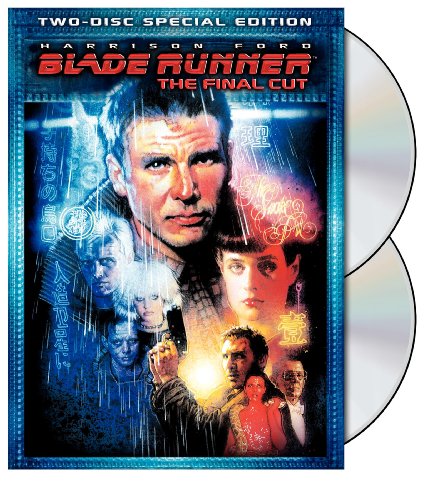All Nonfiction
- Bullying
- Books
- Academic
- Author Interviews
- Celebrity interviews
- College Articles
- College Essays
- Educator of the Year
- Heroes
- Interviews
- Memoir
- Personal Experience
- Sports
- Travel & Culture
All Opinions
- Bullying
- Current Events / Politics
- Discrimination
- Drugs / Alcohol / Smoking
- Entertainment / Celebrities
- Environment
- Love / Relationships
- Movies / Music / TV
- Pop Culture / Trends
- School / College
- Social Issues / Civics
- Spirituality / Religion
- Sports / Hobbies
All Hot Topics
- Bullying
- Community Service
- Environment
- Health
- Letters to the Editor
- Pride & Prejudice
- What Matters
- Back
Summer Guide
- Program Links
- Program Reviews
- Back
College Guide
- College Links
- College Reviews
- College Essays
- College Articles
- Back
Blade Runner: The Final Cut
Upon its reception in 1982, Ridley Scott’s Blade Runner polarized critics, and its now recognizably groundbreaking characteristics were overlooked. Nevertheless, its influence echoed through the years, and in 2007, Blade Runner: The Final Cut elevated the movie to the level of an undisputed classic. It is a cinematic vision that both thrills and laments, less about plot and more about the potency of its sounds, images and ideas.
The year is 2019, and our technology has advanced to the point where we were able to create a species of androids known as Replicants. Replicants are smarter than us and stronger than us, so their creator Dr. Tyrell (Joe Turkel) purposefully condemned them to a four-year life span, and the androids were shipped off to otherworldly sites as slaves. All is apparently well until four of the latest models, Nexus 6, escape and hijack a space ship, murdering a slew of people in the process. They return to earth, bent on surviving and confronting Tyrell himself. This security breach puts responsibility on the blade runners, a sector of law enforcement whose sole purpose is to “retire” Replicants a.k.a. to terminate them. None is better suited for the job than Rick Deckard (Harrison Ford), our drinking, brooding code hero of the future.
Blade Runner is a hallmark in genre innovation, setting the tale of the hardboiled detective in the metropolitan decay of a futuristic machine age. Taking advantage of this genre hybridism, the visual effects and sound crew create a sublime, sensory tour de force that takes science fiction iconography and treats it with a noir makeover . As in classic noir, Blade Runner is keen on heavy shadows and fractured lighting, from the cracks of light darting between window blinds to the glaring beams sweeping from commercial blimps. And true to its science fiction roots, Earth is depicted as both an industrial wasteland and a composition of urban beauty as glittering city lights are courted by bursts of crimson fire and a crack of lightning across the blackened sky. The streets are dank, dark, and slick with rain, and yet the city is vibrant with digital billboards and soaring space-crafts. The soundtrack by Vangelis consists of soulful jazz and contemplative melodies played using synthesizers and artificial instrumentation. Through this blend of effects, Blade Runner finds a naturalistic splendor in an unfamiliar world, achieving the majesty of an aurora borealis and the haunting quality of a dream.
Blade Runner was released around the advent of pop culture science fiction films such as Star Wars, but it offered an elegiac contemplation on society’s technological advances instead of a space opera. It focused on the ramifications of the humanization of machines, influencing films such as Steven Spielberg’s A.I. and Michael Bay’s The Island. The moral questions, especially those regarding the definition of humanity, have been preserved through the years because they are provocative. Blade Runner ultimately emerges as a deftly philosophical work, never preaching but subtly including both Biblical allusions and appeals to society's ethos. It is a thinking-man’s thriller, and while the movie rejects the mile-a-minute pacing popular with typical sci-fi actioners, its ideas add a penetrating urgency to the action scenes. Indeed, ideas are a stronger fuel than the most explosive octane.
These moral questions become even more immediate in this day and age, interesting considering Blade Runner’s premise was developed decades ago by author Philip K. Dick in his 1968 novel Do Androids Dream of Electric Sheep? I recently read in Time magazine that a certain movement is gaining momentum in the U.S. This movement is grounded in the Singularity, a predicted transformation that is expected to occur in the coming years, one where the relationship and balance of power between humans and their machines will be drastically altered. When a super-computer is already outsmarting Jeopardy champions, these questions become more than compelling and not so far-fetched. Blade Runner is by no means realistic (we certainly won’t be colonizing another planet in the next seven years), but I appreciated director Ridley Scott’s vision, a vision that has endured the test of time.
Similar Articles
JOIN THE DISCUSSION
This article has 1 comment.

6 articles 0 photos 1 comment